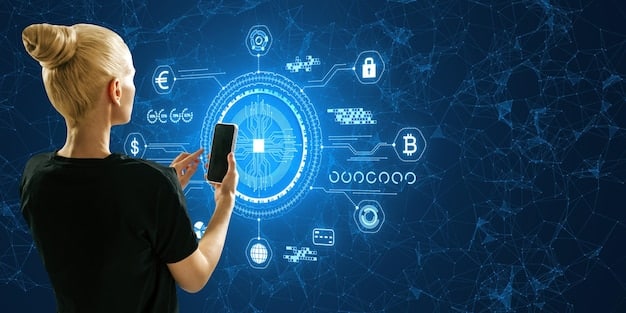Blockchain Identity for US Citizens in 2025: A Self-Sovereign Solution

Blockchain Identity Management offers U.S. citizens a self-sovereign identity solution in 2025, empowering individuals with greater control over their personal data while enhancing security and privacy through decentralized technologies.
Imagine a future where you, as a U.S. citizen, have complete control over your digital identity. Blockchain Identity Management: Exploring Self-Sovereign Identity Solutions for US Citizens in 2025 makes that vision a tangible reality, offering enhanced security, privacy, and autonomy in managing your personal data.
Understanding Blockchain Identity Management
Blockchain identity management represents a paradigm shift in how we handle personal information. It replaces traditional centralized systems with decentralized blockchain networks, granting individuals greater control and security.
In essence, it’s about giving you the power to own and manage your identity, reducing the reliance on third parties and mitigating the risks associated with centralized data storage.
The Basics of Blockchain Technology for Identity
Blockchain, at its core, is a distributed, immutable ledger. When applied to identity management, it allows for the creation of secure and verifiable digital identities.
Key Components of a Blockchain Identity System
These systems typically involve digital wallets, cryptographic keys, and decentralized identifiers (DIDs), which work together to create a self-sovereign identity.
- Digital Wallets: Securely store your identity credentials.
- Cryptographic Keys: Provide authentication and authorization.
- Decentralized Identifiers (DIDs): Unique, verifiable identifiers that are not controlled by any central authority.
By leveraging these components, blockchain-based identity solutions empower individuals to control their data and share it selectively with trusted parties.
The Promise of Self-Sovereign Identity (SSI)
Self-sovereign identity (SSI) is a core concept within blockchain identity management. It signifies the absolute ownership and control of an individual’s digital identity.
SSI empowers individuals to create, manage, and control their own identity data without relying on intermediaries like governments or corporations.

Benefits of SSI for U.S. Citizens
SSI offers numerous benefits, including enhanced privacy, improved security, and reduced identity fraud.
It also streamlines identity verification processes, making it easier for individuals to access services and interact with organizations.
- Enhanced Privacy: You control what information you share.
- Improved Security: Decentralized storage reduces data breach risks.
- Reduced Fraud: Verifiable credentials minimize identity theft.
Ultimately, SSI aims to restore trust in the digital world by giving individuals greater agency over their personal data.
Applications of Blockchain Identity in the US by 2025
By 2025, blockchain identity management will likely be integrated into various aspects of U.S. citizens’ lives, from healthcare to finance and beyond.
These applications will streamline processes, enhance security, and improve overall user experience.
Healthcare
Blockchain identity can revolutionize healthcare by providing patients with secure and portable medical records.
This allows patients to easily share their medical history with doctors and hospitals while maintaining control over who has access to their data.
Finance
In the financial sector, blockchain identity can simplify KYC (Know Your Customer) processes and reduce fraud.
By creating a verifiable digital identity, individuals can easily prove their identity to financial institutions, streamlining account opening and other transactions.

Government Services
Government services can also benefit from blockchain identity by improving efficiency and security.
For example, citizens could use their blockchain-based identity to access government services, vote online, and manage their taxes securely.
Challenges and Considerations
While blockchain identity management holds immense promise, there are several challenges and considerations that must be addressed to ensure its successful implementation.
These include scalability, interoperability, and regulatory compliance.
Scalability
Blockchain networks can be slow and expensive, which can limit their scalability. Addressing this issue is crucial for widespread adoption.
New technologies like layer-2 scaling solutions and sharding can help improve the scalability of blockchain networks.
Interoperability
Different blockchain networks may not be compatible with each other, which can create silos of identity data. Interoperability standards are needed to enable seamless data sharing across different systems.
Efforts are underway to develop universal identity standards that will facilitate interoperability between different blockchain-based identity solutions.
Regulatory Compliance
Blockchain identity solutions must comply with existing privacy regulations, such as GDPR and CCPA. Clear regulatory guidelines are needed to ensure that these solutions are used responsibly and ethically.
Organizations must work closely with regulators to develop appropriate compliance frameworks for blockchain identity management.
The Technological Underpinnings
Understanding the technology behind blockchain identity management is crucial for grasping its potential and limitations.
This section delves into the technical aspects of creating and managing identities on the blockchain.
Decentralized Identifiers (DIDs)
DIDs are at the heart of self-sovereign identity. They are unique identifiers that are not controlled by any central authority, allowing individuals to own and control their digital identities.
DIDs are typically stored on a decentralized ledger, making them resistant to censorship and tampering.
Verifiable Credentials
Verifiable credentials are digital representations of real-world credentials, such as driver’s licenses or diplomas.
These credentials can be verified cryptographically, ensuring their authenticity and integrity. They allow individuals to prove their identity and qualifications without revealing sensitive personal information.
Smart Contracts and Identity Management
Smart contracts can be used to automate various aspects of identity management, such as issuing credentials, verifying identities, and managing permissions.
By using smart contracts, organizations can streamline their identity management processes and reduce the risk of human error.
Looking Ahead: Blockchain Identity in 2025 and Beyond
By 2025, blockchain identity management will likely become a mainstream technology in the U.S., transforming how individuals interact with organizations and access services.
Looking beyond 2025, the potential applications of blockchain identity are virtually limitless.
Increased Adoption and Integration
As the technology matures and regulatory frameworks become clearer, we can expect to see increased adoption of blockchain identity solutions across various industries.
This will lead to greater integration of blockchain identity into existing systems and workflows.
New Use Cases and Innovations
We can also expect to see new use cases and innovations emerge as developers and entrepreneurs explore the potential of blockchain identity management.
This could include things like decentralized social media, privacy-preserving data sharing, and secure online voting.
The Future of Digital Identity
Ultimately, blockchain identity management has the potential to revolutionize the way we think about digital identity, giving individuals greater control, security, and privacy.
As the technology continues to evolve, it will play an increasingly important role in shaping the future of the digital world.
| Key Point | Brief Description |
|---|---|
| 🔑 Self-Sovereign Identity | Individuals control their digital identity without intermediaries. |
| 🛡️ Enhanced Security | Decentralized storage reduces the risk of data breaches and fraud. |
| 🩺 Healthcare Applications | Secure and portable medical records controlled by patients. |
| 🏦 Financial Sector | Streamlined KYC processes and reduced fraud with verifiable digital identities. |
FAQ
▼
Blockchain Identity Management is a decentralized approach to managing digital identities, giving individuals control over their personal data using blockchain technology.
▼
SSI empowers individuals to create and control their own identity data without relying on intermediaries, enhancing privacy and security.
▼
It provides enhanced security, greater privacy, reduced fraud, and streamlined identity verification processes across different sectors.
▼
Scalability issues, interoperability challenges, and regulatory compliance are significant hurdles that need to be addressed for wider adoption.
▼
It will likely be integrated into healthcare, finance, and government services, improving efficiency and security while giving citizens more control.
Conclusion
As we look towards 2025, blockchain identity management is poised to transform the landscape of digital identity for U.S. citizens. By embracing self-sovereign identity solutions, individuals can reclaim control over their personal data, paving the way for a more secure, private, and efficient digital future.





